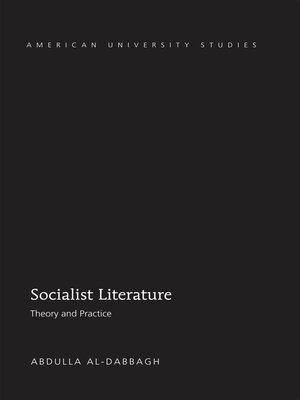Socialist Literature
ebook ∣ Theory and Practice · American University Studies
By Abdulla M. Al-Dabbagh

Sign up to save your library
With an OverDrive account, you can save your favorite libraries for at-a-glance information about availability. Find out more about OverDrive accounts.
Find this title in Libby, the library reading app by OverDrive.



Search for a digital library with this title
Title found at these libraries:
| Library Name | Distance |
|---|---|
| Loading... |
Socialist Literature studies the relationship between the development of socialist literary theory and the process of cultural transformation in modern society by tracing the outline of the theory in the works of Marx, Lenin, and Mao, and examining its reflection in actual works of literature. This analysis is set alongside a detailed examination of the literary part of the cultural superstructure in China and in the Soviet Union. Among the major literary and theoretical works discussed are The communist Manifesto, Talks at the Yenan Forum on Literature and Art, Gorky's Mother, and the poetry of Mayakovsky.
Key issues, like the position of the writer in society, the relationship of the old and the new in literature, and the much discussed relationship between the «creator» and the «audience,» are examined and explained in a different light by regarding them as more than purely theoretical issues or abstract cultural problems and, instead, considering them as social issues that can only be settled at the level of practice.
Abdulla Al-Dabbagh amplifies the area of research by discussing some of the major opposing positions to the theory outlined and, by examining at length the portrayal of proletarian heroism, one of its key concepts, in the literary works of the same epoch. The result of the close textual analysis of a large number of major works of poetry, drama, and fiction reveals the course of the artistic development to be complementary to that of the theoretical advance.
Key issues, like the position of the writer in society, the relationship of the old and the new in literature, and the much discussed relationship between the «creator» and the «audience,» are examined and explained in a different light by regarding them as more than purely theoretical issues or abstract cultural problems and, instead, considering them as social issues that can only be settled at the level of practice.
Abdulla Al-Dabbagh amplifies the area of research by discussing some of the major opposing positions to the theory outlined and, by examining at length the portrayal of proletarian heroism, one of its key concepts, in the literary works of the same epoch. The result of the close textual analysis of a large number of major works of poetry, drama, and fiction reveals the course of the artistic development to be complementary to that of the theoretical advance.







